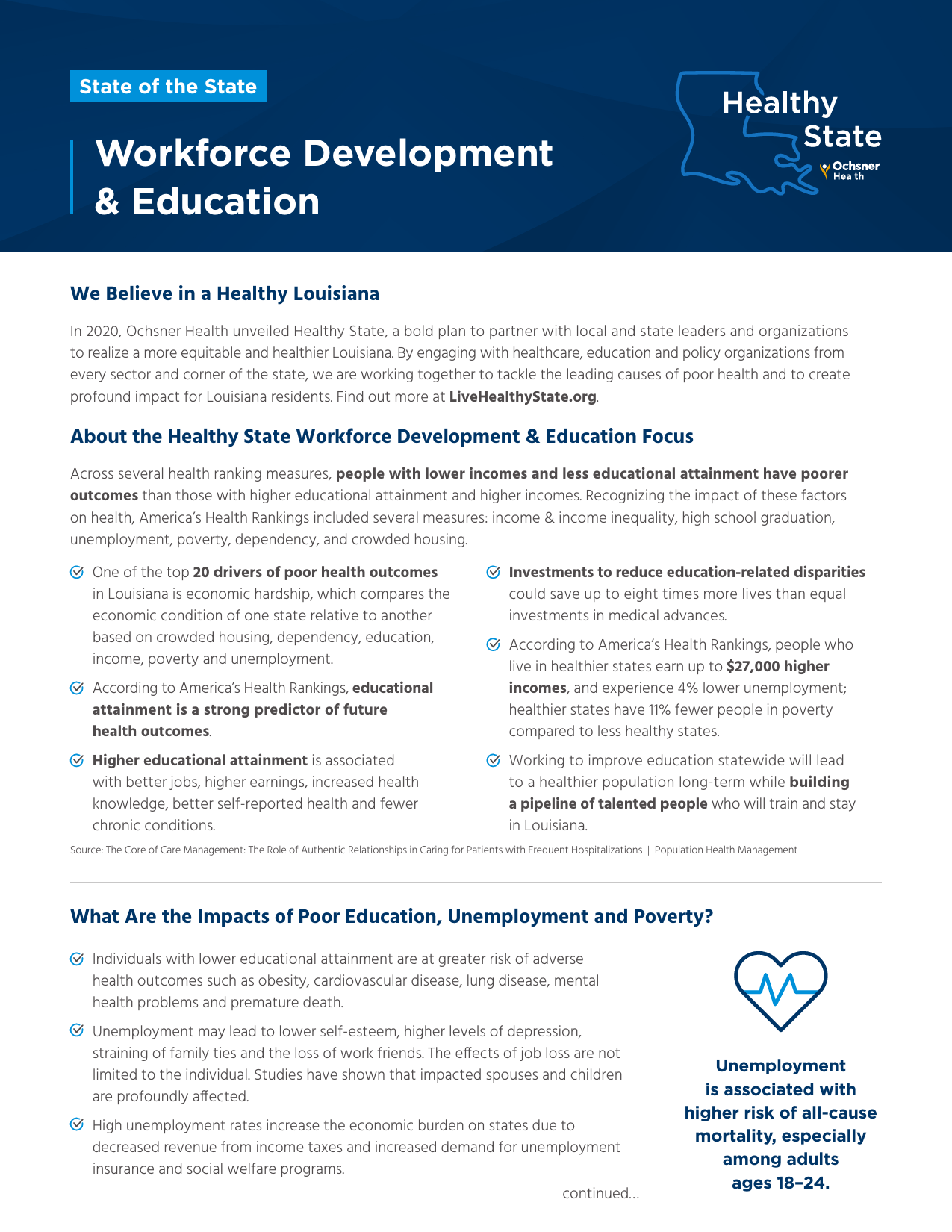
Workforce & Education
Those with lower incomes and educational attainment have poorer health outcomes than those with higher educational attainment and incomes (AHR).

Reduce income inequality and economic hardship and improve high school graduation rates by advancing careers and career pathways into high wage, high demand jobs (AHR).
 $4,838
$4,838
Increase average per-capita income per year
Across several health ranking measures, people with lower incomes and less educational attainment have poorer outcomes than those with higher educational attainment and higher incomes. Recognizing the impact of these factors on health, America's Health Rankings included several measures: income and income inequality, high school graduation, unemployment, poverty, dependency, and crowded housing.
Median Household Income
The income level earned by a household in a designated demographic area, where half the households earn more and half earn less.

More than 50% of household incomes in Louisiana are below $55,416.
What we should know & do to drive change:
Individuals with lower educational attainment are at a greater risk of adverse health outcomes such as obesity, cardiovascular disease, lung disease, mental health problems and premature death. Working to improve education statewide will lead to a healthier population long-term while building a pipeline of talented people who will train and stay in Louisiana (AHR).
Percentage of adults ages 25 and older with at least a high school diploma or equivalent (AHR).
Most impacted populations
- Students who have children
- Students who have a disability
- Students with limited English proficiency
High School Graduation in my community
As of 2023, 83% of Louisiana high school students are graduating with a regular high school diploma within four years of starting ninth grade, which is up from 80% in 2022 (AHR).
Solutions
Keeping children and adolescents in school through high school graduation and beyond is key to increasing equitable health outcomes (AHR). We need to identify strategies to keep students in school longer by adjusting policies and graduation requirements.
Developing interventions that target social, economic, and health-related barriers to graduation will increase high school graduation rates.
Increase work-based learning programs including pre-apprenticeships and apprenticeships.
Louisiana ranks 49th in unemployment (AHR). Workers who were underemployed in their first job were five times as likely to be underemployed five years later as those who were not underemployed in their first job (Strada Education). Labor underutilization reflects the extent to which workers are unable to work as fully as desired and/or not doing work that makes full use of their skills and abilities.
Unemployment is defined as people 16-64 years old who are jobless, looking for a job, and available for work. Sources: AHR; Strada Education; US Bureau of Labor and Statistics
Data Source: Bureau of Labor Statistics, BLS - Unemployment Rate for States
Most impacted populations
Underemployment
- Immigrant workers: Includes highly skilled immigrant workers and foreign degree holders
- Career changers
- Students rejected from professional programs
- Formerly incarcerated people
- Women ages 25-54
- People of color, especially those of Asian decent
Unemployment
- Widowed, divorced, or separated-especially men
- 25-44 years old; especially men
- Women, especially Black/ African American and Latinx
- People with temporary jobs
Unemployment in my community
Louisiana has some of the highest unemployment rates (AHR).
Solutions
Encourage educational attainment. As educational attainment increases unemployment decreases.
Provide career counseling and accessible, affordable training to support individuals who are no longer pursuing professional training programs.
Right-size credentialing is an economic mobility opportunity that matches job requirements with the most appropriate job level. The benefits of right size credentialing include the following:
- Employer: Cost efficiency (salary matches expectations with credentials), lower turnover (increased job satisfaction),
- Employee: greater job satisfaction, increased opportunity for professional development, career stability, and upward economic mobility
Assess job required skills, education, and experience by role and industry to match skills and training requirements more appropriately with jobs.
Develop experience and education equivalency models (Example: 5 years of experience = Degree level) to reduce the barriers to give credit for career experience and to reduce barriers to entry for individuals seeking to change careers.
Create partnerships between employers and educators to develop more robust skills-based training models.
Additional Info
"Underemployment includes three groups of people: unemployed workers who are actively looking for work; involuntarily part-time workers who want full-time work but have had to settle for part-time hours; and so-called marginally-attached workers who want and are available to work, but have given up actively looking. Together, these three groups provide a more comprehensive measure of slack in the labor market. This measure does not include people who have had to settle for employment below their skill or experience level, such as the mechanical engineer who is driving a cab. There is currently no data that track this form of underemployment.
Compared to other labor force statistics, the underemployment rate is relatively new; the census only began to track underemployment as it is currently measured in 1994. The lack of historical data can make it difficult to put current numbers in context with past labor market performance. Regardless, underemployment's broader definition of labor market underutilization makes it an important economic indicator."
Source: Economic Policy Institute
News
Chief Healthcare Executive - How Ochsner Health is working to improve maternal health
The Washington Post - Bloomberg’s Historic Donation Includes Seed Funding for Xavier Ochsner College of Medicine
Priority Area Partners
Join us in building a healthier Louisiana for all.
Regardless of background, everyone is invited to join in shaping a healthier future for Louisiana. Together, through collective action and collaboration, we can make this vision a reality. Whether through volunteering, advocacy, or support, every contribution counts in building a healthier Louisiana for all.
Submission Complete!


















